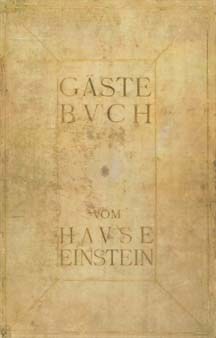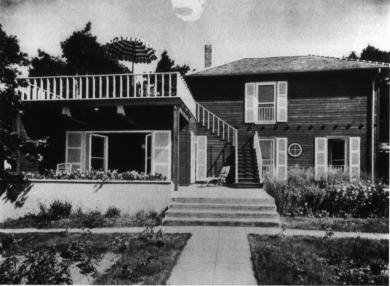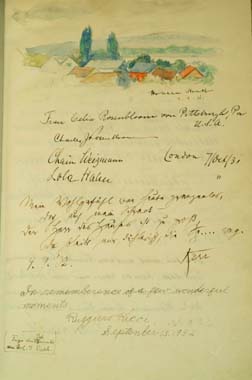“Einer muss der erste sein
Der sich in dies Buch trägt ein.
Darum, ohne viel zu grübeln,
Ob es Würd’gere mir verübeln,
Und trotz der mir eigenen Klaue
setze ich an diese Stelle
meinen Namen hin
M. Laue”
‘One person has to be the first
To write his name into this book.
Therefore, without much pondering,
And whether more worthy people
may hold it against me,
And despite my terrible handwriting
I write my name here
M. Laue’
Entry into the Caputh house guestbook by Max von Laue (1879-1960), May 4, 1930
EINSTEIN‘S CAPUTH HOUSE GUESTBOOK
Hint: Except for the entry of the American violinist Ruggiero Ricci all entries in Einstein‘s guestbook are written in German language.
Shortly after Albert Einstein and his wife Elsa had moved into their summer house in Caputh in September 1929, they were given a guestbook as hansel from their neighbours, the “Regierungsbaumeister“ (government-approved master builder) Adolf Stern and his wife Elsbeth. On the first page they had written the following dedication:
“Dem großen Nachbar in Verehrung gewidmet vom Hause Stern – Caputh, September 1929.”
‘To our great neighbour – dedicated with admiration – the Sterns – Caputh, September 1929.’

The guestbook’s dimensions were approx. 34.5 cm x 23 cm x 2 cm. On the light cover consisting of thick parchment there was written in gold embossing:
“GÄSTEBVCH VOM HAVSE EINSTEIN”.
‘House of Einstein – guestbook’
From the approx. 240 white pages only the first page bore the above-mentioned dedication of Adolf and Elsbeth Stern.
The original of the guestbook can now be viewed in Leo Baeck Institute in New York.
Picture Credits:
By courtesy of Leo Baeck Institute, New York
AR136 Albert Einstein Collection
Albert Einstein Caputh House Guestbook 1929-1932 (ROS12)
Now the Einsteins had a guestbook in their summer house and all guests should write into it. Albert Einstein wanted the entries to be written as little poems. Therefore he wrote the following “piece of advice“ onto the third page of the guestbook, right next to a small drawing of his:
“Prosa verboten”
“Verordnung
Männer Weib und Kinderlein
Tragt Euch in dies Büchlein ein
Aber nicht mit plumpen Worten
Wie man mauschelt allerorten
Nur mit Verschen fein und zart
So nach heitrer Dichter Art
Fürcht Dich nicht und plag Dich nur
Kommst schon auf die gute Spur!
Im Namen der Caputher Guts-Verwaltung
der Hausherr.”
‘No prose’
‘Piece of Advice
Men, women and children,
Please write into this book,
However, not with plump words
As they are used everywhere
But with verses soft and fine
like poets did in the old time
do not fear but slave away
then you will also master the task!
In the name of the Caputh estate manager, the man of the house.’

Albert Einstein welcomed many guests in his summer house in Caputh, among them were scientists, intellectuals, artists, authors and politicians. Family members like his sister Maja and his sons Hans Albert and Eduard were also guests in Caputh. Thus Einstein invited his son Eduard in March 1931 with the following words:
“Sei ein gutes faules Tier – Streck alle Viere weit von Dir. Komm nach Caputh, pfeif auf die Welt Und auf Papa, wenn Dirs gefällt.”
‘Be a good and lazy animal – Put your feet up. Come to Caputh, don’t care about the world and about your dad if you like.’
Despite many guests only 20 persons wrote into the guestbook. Some did it as Albert Einstein wanted them to do – with a small “verse”. Others made a small drawing, music notes and some only wrote the date of their stay and signed. The reason that only so few guests wrote into the guestbook may have been that the book was situated in the wrong place in the house and was only taken out to write in it.
The first entry of a guest dates May 4, 1930 and is from Einstein‘s friend, the German physicist and Nobel Prize laureate Max von Laue. He wrote this “poem” (see above) on the same page on which Einstein had already written his “piece of advice”. The third entry on this page is from the Indian author Rabindranath Tagore who visited Einstein in Caputh on July 14, 1930. However, Tagore probably ignored Einstein’s wish because he only wrote down his name and the date full of verve at the bottom of the page.
The couple Anton and Adele Macholl wrote a “verse” on the following page of the guestbook. The acquaintance of Adele Macholl and Elsa Einstein can be traced back to a joint friend from school. The “Macholl couple” visited Elsa and Albert Einstein on July 19, 1930.
“Höhenlage, Wind und Sonne,
Blick in Ferne – Augenwonne:
Alles hell und luftig = heiter.
Aussen, innen, bleib es weiter!
Dieses wünscht Euch Jahr für Jahr
das Machollsche Ehepaar.”
‘Altitude, the wind and sun,
a look in the distance – for the eyes real fun:
everything clear and airy = wow.
Outside, inside, may it stay as it is now!
This is wishing you year for year
the Macholl couple.’
At the bottom of the page is the entry of the Swiss musician Edwin Fischer who wrote on September 24, 1931 below some notes of W. A. Mozart:
“Eine Fuge, bei der man nicht merkt dass es eine ist.”
‘A fugue where you do not know that it is a fugue.’
Directly below follows the entry of Toni Mendel, a friend of Einstein, also dated September 24, 1931. She wrote:
“Heute ham mir keine Händl
Ob ich gleich die Toni Mendel”
‘Today there is no Händl
Though my name is Toni Mendel’

All the following guests wrote onto the fifth page of the guestbook which is shown here:
The first entry stems from the German painter Hermann Struck who visited Einstein on August 7, 1931 and drafted Caputh from the view of Einstein’s terrace. The next entry originates from Celia Rosenbloom, the wife of Sol Rosenbloom who was connected to Einstein via his engagement for a university in Jerusalem, and her son Charles from Pittsburgh, USA. They visited Caputh on the same day as the Israeli politician Chaim Weizmann who came from London and Lola Hahn-Warburg, the oldest daughter of the banker Max Warburg. They all only left their signature and the date of their visit. It was October 7, 1931.
Unlike the German author and drama critic Alfred Kerr. He wrote into the guestbook on September 4, 1932:
“Mein Wohlgefühl war heute grenzenlos,
doch auch mein Schreck –
der Herr des Hauses ist zu groß,
da bleibt mir, dichterisch, die Sp…. weg.”
‘My wellbeing today was infinite,
but my terror also was –
as the man of the house is too tall
poetically this renders me speechless.’
The last visitor who wrote on this page was the fourteen-year-old American violinist Ruggiero Ricci who visited Einstein on September 13, 1932. He wrote in exerted calligraphy:
“In rememberence of a few wonderful moments”
‘In rememberence of a few wonderful moments’
One entry at the lower left bottom asks riddles. There is a note of Einstein saying:
“Fuga der VI. Solo Sonate von Joh. S. Bach.”
‘Fugue of the VI. Solo Sonata of Joh. S. Bach.’
Picture Credits:
By courtesy of Leo Baeck Institute, New York
AR136 Albert Einstein Collection
Albert Einstein Caputh House Guestbook 1929-1932 (ROS12)
On September 24, 1932 the Austrian conductor Erich Kleiber visited the Einstein’s in Caputh together with his wife Ruth. They wrote on the sixth page of the guest book:
“- – – – – gewonnen
– – genommen
Wir haben sogar Briefe gelesen,
Die anderen Leuten verboten gewesen!
Mit herzlichem Dank”
‘- – – – – won
– – taken away
We even read letters,
Which others wouldn’t have been allowed to read!
With our best thanks’
Some days later, on September 29, 1932, Margarete Herrmann visited Einstein. She was a musician who – according to Einstein’s secretary Helen Dukas – from time to time made music with Einstein. She wrote below the entry of Erich Kleiber into the guestbook:
“Man weicht der Welt nicht sicherer
aus, als durch die Kunst, und man
verbindet sich nicht sicherer mit
ihr, als durch die Kunst. (Göthe)
In dankbarer Erinnerung an
manches gemeinsame Musicieren”
‘There is no way of more surely avoiding the
world than by art, and it is by art
that you form the surest
link with it. (Göthe)
In thankful rememberance of
our joint playing music’
At the bottom of page six there is the entry of the German physician Leopold Lichtwitz who wrote the following into the guestbook at Einsteins’ in Caputh on October 23, 1932:
“Ich bin mit meinen Hunden hergekommen
Und dabei kam es raus und ward entdeckt:
Die Hunde haben sich sehr schlecht benommen.
Vor’m Hausherrn haben Hunde nicht Respekt.”
‘I have come here with my dogs
And then I discovered:
The dogs behaved very badly.
They don’t have any respect for the man of the house.’
There are two entries on the seventh page of the guestbook. The first one stems from the German sociologist and economist Franz Oppenheimer. He wrote the following entry on November 21, 1932:
“Was soll ich mir lang das Gehirn zerkrachen?
So gut wie GOETHE kann ich’s nicht machen:
‘ Weite Welt und breites Leben,
Langer Jahre redlich Streben,
Stets geforscht und stets gegründet,
Nie geschlossen, oft geründet,
Aeltestes bewahrt mit Treue,
Freundlich aufgefasst das Neue,
Heitrer Sinn und reine Zwecke:
Nun, man kommt schon eine Strecke!’
Das gilt auch für Andere allein,
Sie müssen – Genies wie der Wolfgang sein.”
‘Why should I tax my brain for long?
I simply can’t do it like GOETHE:
‘Wide of world and broad in living,
Long years’ single-hearted striving,
Ever seeking, fathoming ever,
Rounding oft, concluding never,
Oldest truth in fealty keeping,
Newest truth in gladness greeting,
Mind serene, and pure ambition:
Make good faring on life’s mission!’
This also applies for all the others,
They have to be geniuses like Wolfgang.’
Incidentally the first and last entry originates from Einstein‘s friend Max von Laue. His second entry into the guestbook on November 29, 1932 reads:
“Der Einstein ist ein grosser Mann
Die ganze Welt weiss, was er kann
Die grösste Leistung kennt sie nicht:
Er brachte mich (!) zum ersten Gedicht!!
(siehe Seite 1)
29.11.32 M. Laue.”
‘Einstein is a real great man
All the world knows what he can
But it does not know his biggest success:
He made me (!) write my first poem!!
(see 1st page)
29.11.32 M. Laue.’
This is the last entry into the Caputh house guestbook of Albert and Elsa Einstein. Only few days later, on December 6, they both left Caputh to travel by boat from Antwerpen to California, USA on December 10, 1932. Because of the political proportion of power and the following associated incidents in Nazi Germany Albert Einstein never again entered German ground.
List of persons who wrote into the guestbook:
| September 1929 | Adolf and Elsbeth Stern | “Regierungsbaumeister“ (government-approved master builder), Einstein‘s neighbours | |
| Sunday | May 4, 1930 | Max von Laue | German physicist |
| Monday | July 14, 1930 | Rabindranath Tagore | Indian poet and philosopher |
| Saturday | July 19, 1930 | Anton and Adele Macholl | |
| Friday | August 7, 1931 | Hermann Struck | German painter |
| Thursday | September 24, 1931 | Edwin Fischer | Swiss piano player and conductor |
| Thursday | September 24, 1931 | Toni Mendel | |
| Wednesday | October 7, 1931 | Celia and Charles Rosenbloom | |
| Wednesday | October 7, 1931 | Chaim Weizmann | Israeli politician |
| Wednesday | October 7, 1931 | Lola Hahn-Warburg | |
| Sunday | September 4, 1932 | Alfred Kerr, formerly known as Alfred Kempner | German author and drama critic |
| Tuesday | September 13, 1932 | Ruggiero Ricci | American violinist |
| Saturday | September 24, 1932 | Erich and Ruth Kleiber | Austrian conductor |
| Thursday | September 29, 1932 | Margarete Herrmann | |
| Sunday | October 23, 1932 | Leopold Lichtwitz | German physician |
| Monday | November 21, 1932 | Franz Oppenheimer | German sociologist and economist |
| Tuesday | November 29, 1932 | Max von Laue | German physicist |
It still remains unanswered up to now how the guestbook – which for a long time seemed to be lost – came from Caputh to New York to Leo Baeck Institute, where it is since the middle or the end of the 80ies. It is not very possible that Einstein took the guestbook with him when he travelled to the USA in December 1932. Thus it must have stayed in Caputh. Probably Rudolf Kayser, the husband of Einstein‘s oldest stepdaughter Ilse, “saved” the book from Caputh and sent it with other relocation goods to the USA to Einstein. Maybe the reason was that it stayed for many years untouched in Einstein‘s house in Mercer Street 112, Princeton. After Einstein‘s death Helen Dukas, his secretary and executor, could have given the guestbook to Leo Baeck Institute in New York some years later. However, maybe it went to Leo Baeck Institute only after the death of Helen Dukas in 1982. Another possibility is that Einstein’s stepdaughter Margot kept the guestbook and after her death in 1986 it was given to Leo Baeck Institute.
The original guestbook came back to Caputh for a few months in 2008. There it was displayed within the scope of the Theme for the Year “Province and metropolis | metropolis and province” of “Kulturland Brandenburg” and presented to the public. It was displayed in the permanent exhibition concerning the history of the summer house of the Einstein’s “Einstein‘s summer idyll in Caputh”. Today there is a facsimile of the book. Furthermore there is a documentation on exhibition boards about the biographies of the guests who wrote into the guestbook.
Picture credits:
By courtesy of Leo Baeck Institute, New York,
AR136 Albert Einstein Collection; Albert Einstein Caputh House Guestbook 1929-1932 (ROS12): 1, 3
Stiftung Archiv der Akademie der Künste, Berlin, Konrad-Wachsmann-Archiv, Signatur: KWA-28-8/1: 2
Bibliography:
| Erika Brizke | Einstein in Caputh (Hundert Autoren für Einstein) | Weinheim 2005 |
| Michael Grüning | Ein Haus für Albert Einstein | Berlin 1990 |


 DEUTSCH
DEUTSCH